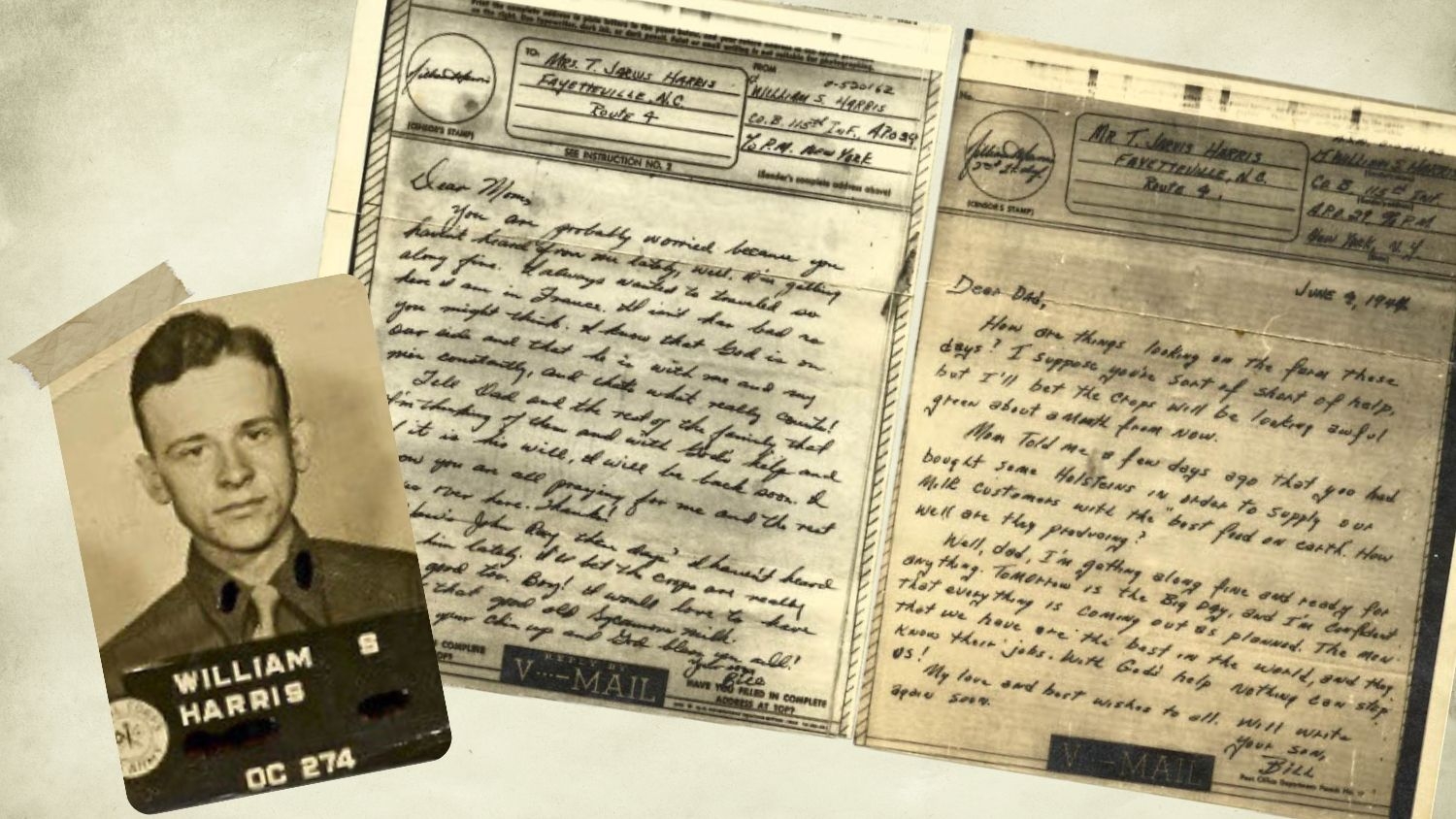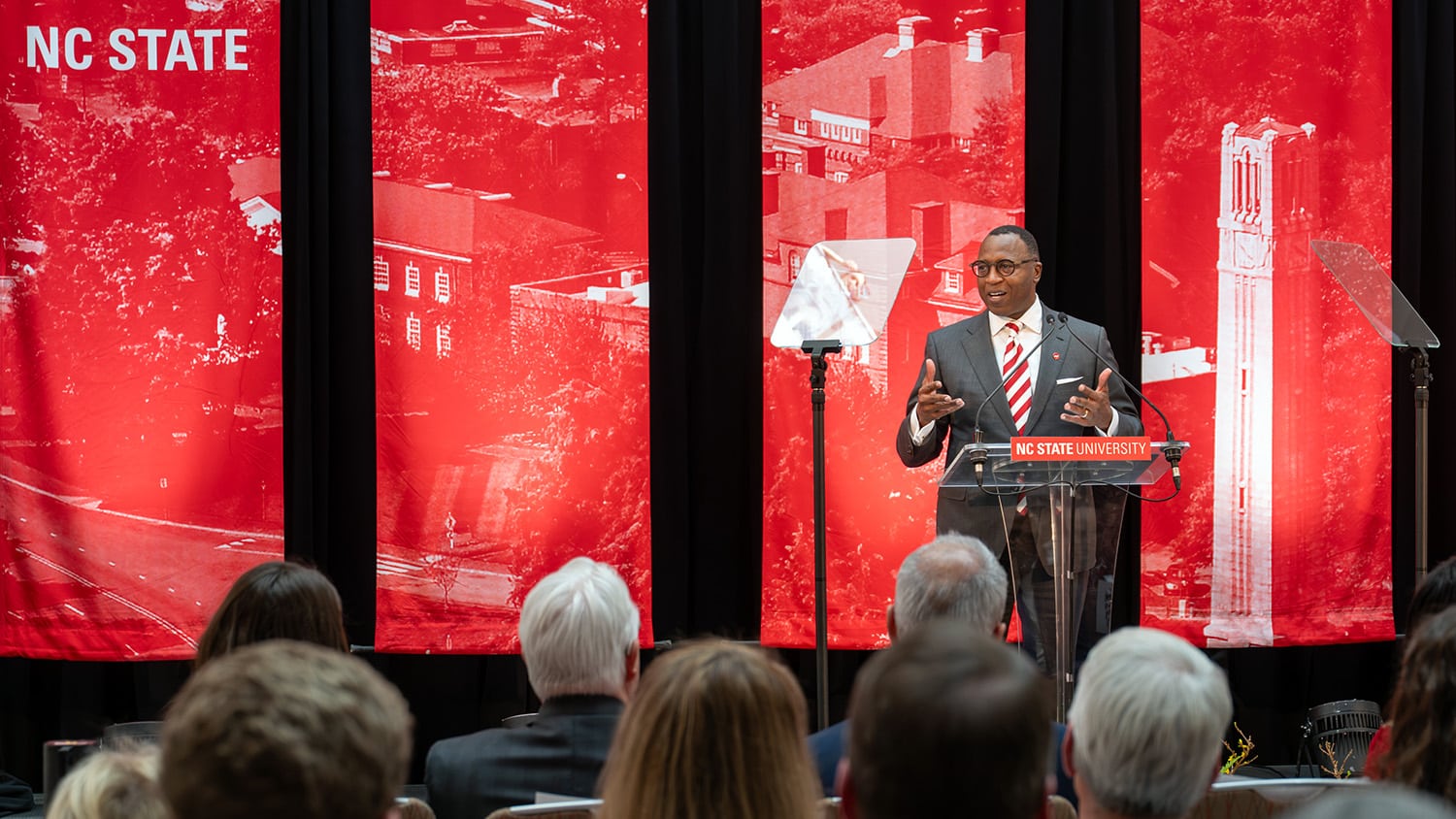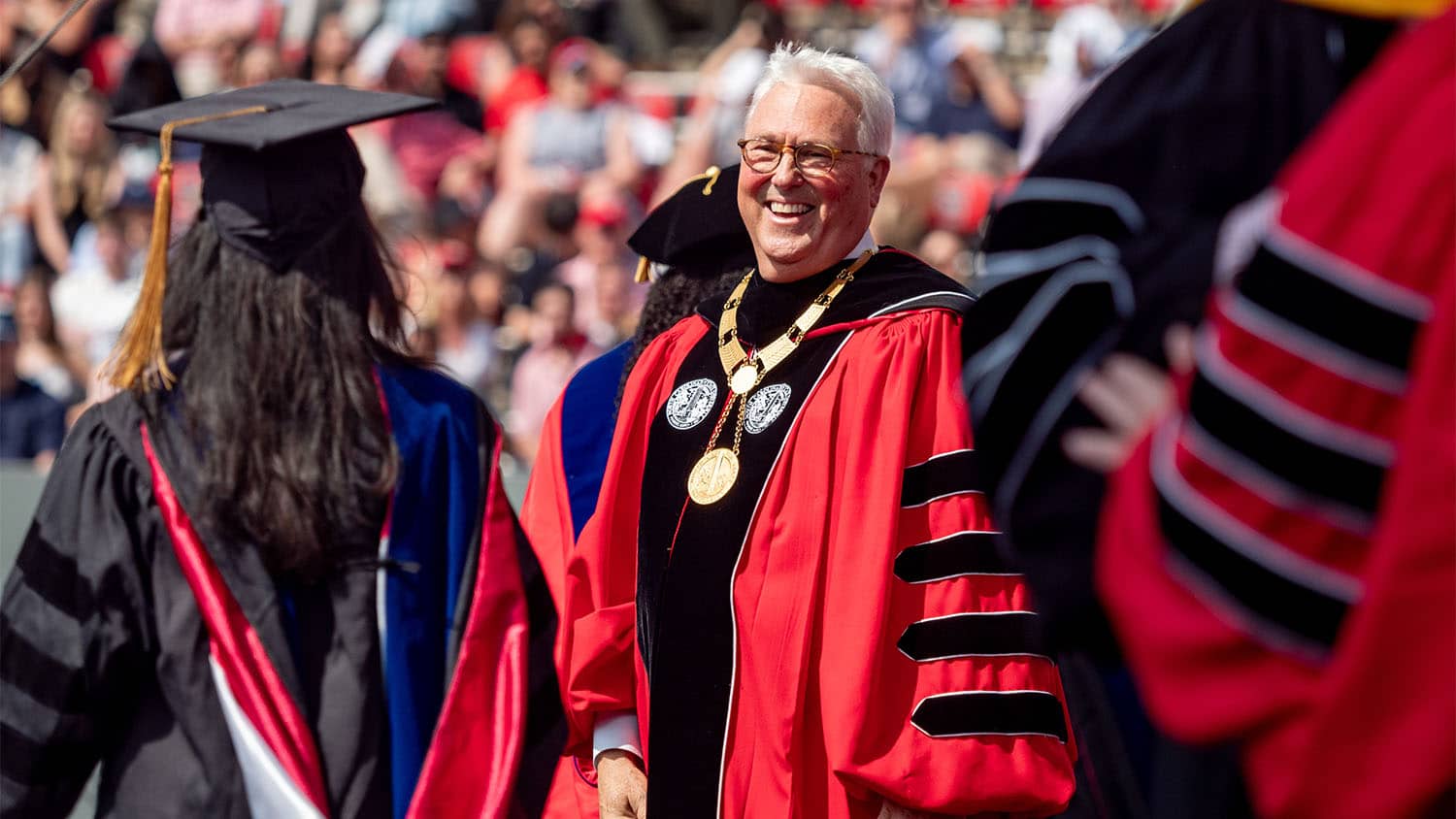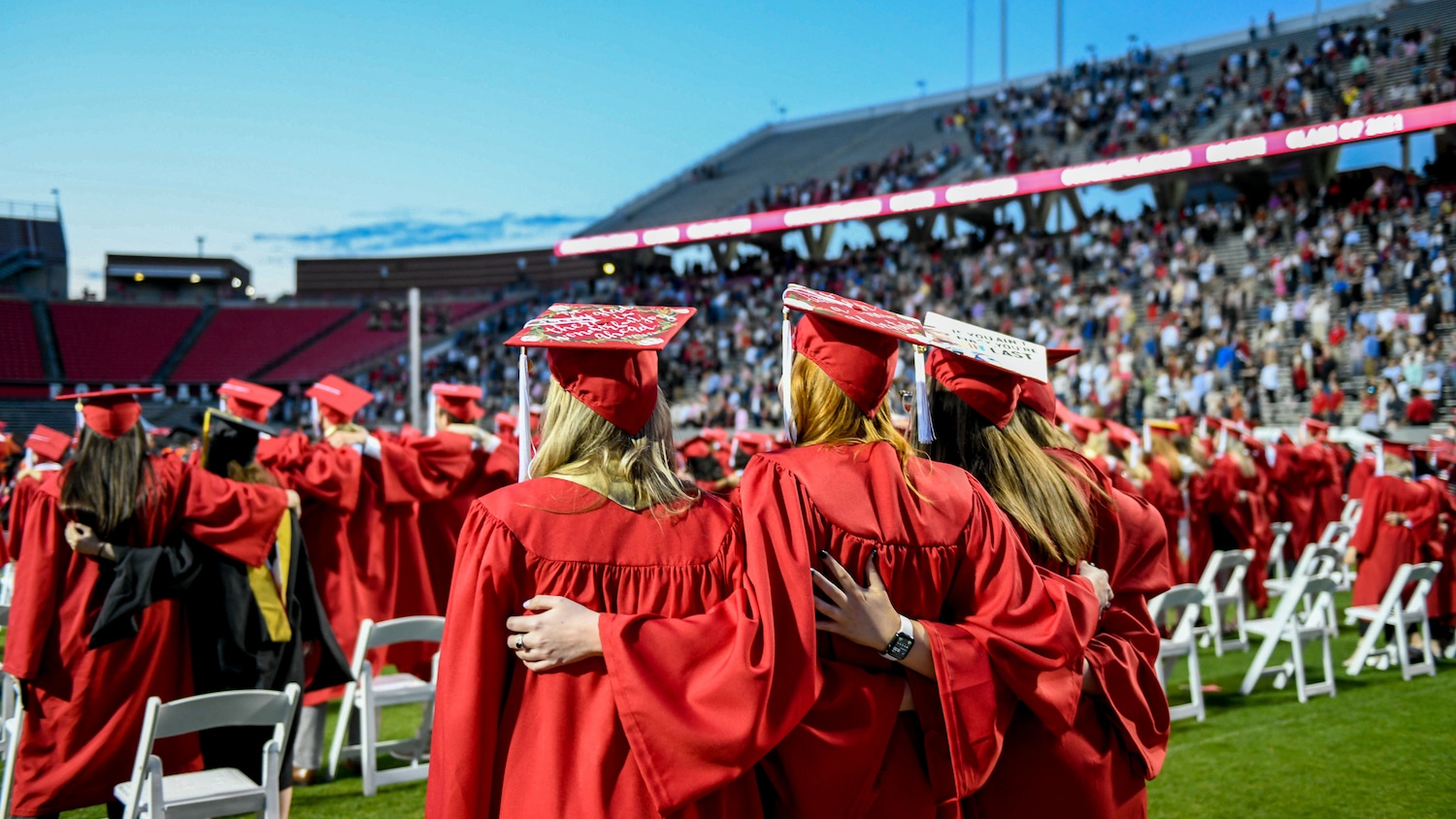More than 80 years after dairy manufacturing graduate William S. Harris departed for Army service in World War II, his memory lives on through a fund to help veterans complete agricultural degrees at NC State University.
Harris’ letters home have given family members the opportunity to learn about their uncle’s experiences on campus and in the military. His writings are now part of the University Archives, and his family established the Sycamore Stipend Fund for Veterans in the Agricultural Institute.
The fund’s name comes from Sycamore Dairy, founded in 1926 by the Harris family. Located in Fayetteville, North Carolina, it became a vital supplier of milk and juice products to nearby military installations like Fort Bragg and Camp Lejeune as the demand for agricultural goods surged across the U.S. during World War II.
William S. Harris, one of 12 siblings, was expected to oversee the farm’s operations. To prepare, he enrolled at the North Carolina State College in 1939 to study dairy manufacturing in the School of Agriculture and Engineering (now the College of Agriculture and Life Sciences).
Campus life during this time reflected the nation’s wartime shift. In 1940, the dedication of new dairy barns for the first Livestock Day showcased the growing emphasis on agricultural innovation. By 1943, State College had become a dual-function institution, serving both civilian students and thousands of military trainees through U.S. War Department programs. ROTC drills, defense classes and scaled-down enrollment defined the student experience, as many young men left early to enlist.
Harris balanced his academic studies with his duties as an Army ROTC cadet. In letters home to his parents, he described daily routines on a campus shaped by war. He graduated in 1943 and was commissioned as a second lieutenant in the U.S. Army. By June 1944, he was on the shores of Omaha Beach with the 29th Infantry Division. Twelve days after landing, he was killed in action in Normandy.
Through the Sycamore Stipend Fund for Veterans in the Agricultural Institute, a new generation of NC State students can receive support to study agriculture following military service. Created by Harris’ niece, Mary Harris Jasmine, the fund assists veterans pursuing degrees through the Agricultural Institute.
Jasmine’s brother, Mike Harris, never met his Uncle William. However, through the letters his uncle sent home from State College between 1939 and 1943, Mike Harris got to know the young man whose life was shaped by agriculture and service.

A 36-year forestry professional, Mike Harris is preserving his uncle’s memory by donating select letters and memorabilia to the NC State University Archives. These handwritten notes offer a rare glimpse into campus life during wartime, capturing everything from class schedules to campus life. Harris spoke with CALS about his efforts to honor his uncle’s memory.
Tell us about your uncle’s time at NC State.
A letter to his mother dated Sept. 12, 1939 (during his first semester), described how my uncle was running from one building to another because of the red tape involved with registering for classes. He lived in one of the newly erected dormitories. The students didn’t have any lights or beds when they moved in. But it was modern because of the running water. So they felt like they were doing OK, even though they didn’t have lights for a week or two. In a following letter, he said meals cost just as much as his tuition and fees, roughly $90 a quarter.
In November 1939, he and his classmates met with the dean of students to learn if they had passed or failed a class. If they failed, they received pink slips.
He majored in dairy manufacturing. In 1942, one of his advisors suggested that, instead of taking summer classes, he ought to work for Pine State Creamery to broaden his experience.

William was an ROTC graduate. How did he deal with the possibility of enlistment?
In his letter dated Feb. 19, 1942, he said 150 Army Air Corps Reserve students were called to duty. Some were supposed to graduate in June, but obviously, they weren’t able. In March 1943, he noted that 600 soldiers from the Army were there taking engineering courses, and they took up anywhere from a quarter to half of the dining hall.
He didn’t think any of the ROTC students would get called up. But there was a likelihood. You’ve got a generation that tried to complete their education, but they’re getting called up before June graduation, so they’re not going to complete their degree. A lot of young men never returned home to fulfill their dreams.
Describe your uncle’s military service timeline.
In April 1943, he was appointed to Officer Candidate School at Fort Benning, Georgia. He was then temporarily stationed at Camp Croft, South Carolina, followed by an assignment to Fort Meade, Maryland. In December 1943, he transferred to England as part of the U.S. and Allied buildup ahead of the Normandy invasion.
He was assigned to Company B, 115th Infantry Regiment, 29th Infantry Division, and held the rank of second lieutenant. He landed on Omaha Beach with the second wave on D-Day, June 6, 1944, and was killed in action in Normandy on June 18, 1944.

Your uncle didn’t fulfill his plan of managing Sycamore Dairy. How did the business cope with his passing?
Grandpa Harris’ Sycamore Dairy grew with the expansion of Fayetteville and Fort Bragg. The dairy needs were there, and the herd and milk production grew. My dad and one of my other uncles ran the dairy farm until the early 1970s, retaining a bottling plant until the 1980s. (Sycamore Dairy ceased operations in 1989.) You can’t help but think, had my uncle returned home with his knowledge from State College, what the future of Sycamore Dairy or Cumberland County could have been.
How did William’s service impact your family’s connection to NC State and agriculture?
My family respected NC State and the wealth of knowledge there. Grandpa Harris was a Cumberland County commissioner who saw the value of education. NC State, a land-grant school promoting agriculture, was a good resource to help improve the industry.
How would you like future generations to view past veterans’ services and contributions to North Carolina agriculture?
So many of that 1930s and ‘40s generation saw a need. They stepped up to that need, not thinking about their own. That’s over 80 years ago. I think we experience a disconnect between the sacrifices people like my uncle made for the benefit of their fellow man. One hundred fifty Air Corps Reserve NC State students didn’t get to complete their degrees. You don’t know what could have been had the war not interrupted their lives so abruptly.

What does veteran support from the Sycamore Stipend Fund mean to you?
The Sycamore Stipend Fund assists our veterans in completing their agricultural studies, which benefits the state, the economy and themselves. They’ve already sacrificed part of their lives and want to fulfill their dream of working in agriculture. I’ve read about some of the fund recipients. It made a big difference for them being able to pay for housing, gas and other necessities.
Today’s young men and women have put some of the best years of their lives on hold to serve their country, and they want to come back and pursue a degree at NC State. And quite honestly, I think that makes a better student. Sometimes they have better focus after serving for a few years. They put their lives on hold for three or four years. At the very least, this is an acknowledgment to say thanks. I think it’s just a great thing to do.
This post was originally published in College of Agriculture and Life Sciences News.
- Categories:



